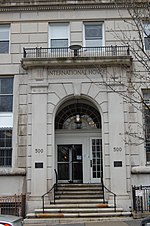Rabbinical Assembly
The Rabbinical Assembly (RA) is the international association of Conservative rabbis. The RA was founded in 1901 to shape the ideology, programs, and practices of the Conservative movement. It publishes prayerbooks and books of Jewish interest, and oversees the work of the Committee on Jewish Law and Standards for the Conservative movement. It organizes conferences and coordinates the Joint Placement Commission of the Conservative movement. Members of the RA serve as rabbis, educators, community workers and military and hospital chaplains around the world. Rabbis ordained by Jewish Theological Seminary of America (New York, New York), the Ziegler School of Rabbinic Studies at the American Jewish University (Los Angeles, California), The Seminario Rabínico Latinoamericano (Buenos Aires, Argentina), The Zacharias Frankel College (Berlin, Germany) and The Schechter Rabbinical Seminary (Jerusalem, Israel) automatically become members of the RA upon their ordination. Rabbis whose ordination is from other seminaries and yeshivas may also be admitted to the RA. As of 2010, there were 1,648 members of the RA.The majority of RA members serve in the United States and Canada, while more than ten percent of its rabbis serve in Israel and many of its rabbis serve in Latin America, in the countries of Europe, Australia, and Africa.
Excerpt from the Wikipedia article Rabbinical Assembly (License: CC BY-SA 3.0, Authors).Rabbinical Assembly
Broadway, New York Manhattan
Geographical coordinates (GPS) Address Nearby Places Show on map
Geographical coordinates (GPS)
| Latitude | Longitude |
|---|---|
| N 40.812148 ° | E -73.960768 ° |
Address
Broadway & West 122nd Street
Broadway
10115 New York, Manhattan
New York, United States
Open on Google Maps






